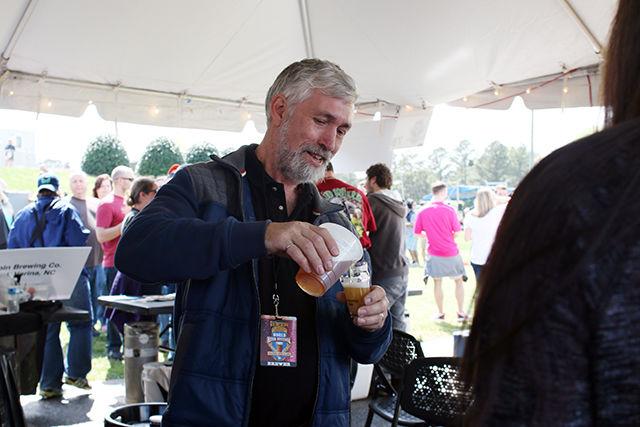NC State now offers a brewing science and technology minor to undergraduate students. Previously, only an introduction to brewing course was available.
According to Sebastian Wolfrum, a lecturer in the food science department and owner of Epiphany Craft Malt in Durham, the University established funding for the minor after signing an agreement with New Belgium to produce NC State’s branded lager Old Tuffy, which is sold at Carter-Finley Stadium and other various places across Raleigh.
“When that agreement was signed with the University, a good chunk of that money was earmarked for education,” Wolfrum said. “And that’s where they were able to essentially hire me as a teacher and then set everything up. So there’s a full-on minor. And so with that, we are well on our way to having a full-on brewing program established.”
When Dr. John Sheppard, the director of undergraduate programs for bioprocessing science, came to NC State in 2006, he brought a pilot skill research brewery that was installed on campus.
“For many years, it was just a research brewery, I had graduate students doing various projects with regards to brewing science,” Sheppard said. “We eventually got a license to be able to sell our beer. Now the focus is more on undergraduate teaching, rather than research. And this is through the recently created minor and brewing science. So we still use the brewery, but it’s mainly for teaching purposes now.”
According to Sheppard, any students interested in microbiology would benefit from taking the minor even if they don’t plan to work in the brewing industry.
“Depending upon your career aspirations, the kind of science and technology topics that we cover are pretty well common to all of or most of the biomanufacturing industries,” Sheppard said. “So whether they be a company making kombucha or yogurt, or even biopharmaceuticals, they use a lot of the same technology, and a lot of the same science background is necessary to work in those particular industries. It is a really good overview of the use of microbes for developing fermentation-based products. I mean, there’s a lot of new fermentation products coming on the market and a lot of new companies starting up.”
According to Sheppard, food sciences is the ideal major to pair with a brewing science and technology minor because many required courses overlap, but many majors in other departments would also benefit from taking this minor.
“We have a lot of students in chemical engineering that take the first course, brewing science and technology, because a lot of engineers are interested in brewing science and potentially working at a brewery or owning a brewery,” Sheppard said. “But it’s again going to be difficult for engineering students to take all three courses unless they decide to stay around a little longer.”
Although the minor focuses on the science and technology behind the fermentation process, a few classes in the introductory class discuss the business and analytics of the industry.
“I go a little bit into how distribution works, and how the costs come together; on what the differences are between a small brewery and a midsize and large brewery, and there will be [students] who ask them a lot more in those segments,” Wolfrum said. “I had two in my class who wanted to really explore potentially opening a brewery. And so with them, I just met separately and gave them a little bit of pointers. And there is plenty of literature in the brewing field on that side, on how to even write a business plan in brewing and all that.”
Wolfrum hopes teaching about the process behind making alcohol will lessen the stigma against drinking, as well as encourage college students to develop good drinking habits and behaviors.
“A lot of these breweries, if you go into Raleigh or Charlotte or whatever, those are family gatherings where there’s kids running around, and that seems very healthy to me,” Wolfrum said. “The problem is with a lot of these things, once they’re so strictly set up, then, in colleges in particular, it becomes this crazy drinking culture that is not healthy for anyone. By the time people are legally allowed, it’s like floodgates open.”
According to Sheppard, any students considering taking the minor should begin the course fairly early, ideally as a second- or third-year student.
“If you wait until your senior year, it’s not going to happen because you are going to take at least three courses in the proper sequence,” Sheppard said. “So think about it early, rather than late so that you can plan it into your course schedule, so you don’t end up having to take an extra semester, for example.”
Learn more about the brewing science and technology minor requirements here.













